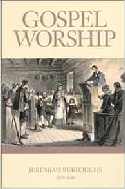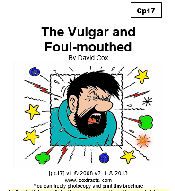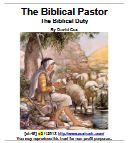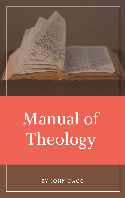Ads
Cults: What is their source of Authority? describes the marks of a cult so you will know how to identify them.

The very first thing to understand about cults, false religions, and just plain abusive churches is that they insert themselves into religion for a purpose. They are not directly following God, but they are following their own plan for profit and “entertainment”. I say entertainment because a plan has a specific goal to accomplish, but there are a few that are in this just for the “fun” of messing with people’s lives.
Since these people are not submissive to God because they are not saved, they have a specific characteristic that would distinguish them from “good brethren”. The distinctive is their attitude towards Scripture, or as we refer to it, their Source of Authority.
For an overview, see
False Prophets and Teachers Overview
Contents
- 0.1 An unbiblical Source of Authority
- 0.2 Their Openly disclosed Authority
- 0.3 Why Cultists always mess up on the Authority of Scripture
- 0.4 Coping Tactic #1 – Flat out refusal to Obey
- 0.5 Coping Tactic #2 – Use a “Safe” version of the Bible
- 0.6 Coping Tactic #3 – Bible is “cryptic” without our help
- 0.7 Coping Tactic #4 – Ignore what you don’t like, don’t preach the whole counsel of God.
- 0.8 Coping Tactic #5 – New Revelations
- 1 Discernment Helps for Source of Authority
An unbiblical Source of Authority
These groups, by definition, are out to get something as every legitimate church and Christian is.
First, let’s look a valid people in church work. A valid Christian and church work in religion in order to please God. They are marked by a personal relationship with God (salvation), and they are obedient to God, and they highly treasure and prize God, especially Jesus Christ their Savior, and everything they do revolves around that relationship with Christ. Because of that, they great fear God, and their religious work must be focused on pleasing God, and this is only done by (1) knowing the will of God, (2) applying it to what they are doing in religious work. Cults: What is their source of Authority?
Secondly, a cult is going to work on a different basis. They make up their own rules, but because they are fisherman trying to catch valid Christians in their nets of deception, they try to act and be like real Christian ministers and churches as much as possible.
Their Openly disclosed Authority
Every group openly discloses some source of authority. Many will say they believe the Bible. For example, the Jehovah’s Witnesses and Mormons. Even though many or most groups will claim to hold the Bible as their source of authority, one must evaluate these claims and investigate their actual working procedure to see what is their real source of authority. There are some tricks that cultists use in disguising their source of authority.
Biblical Church: Their appeal to authority is always with chapter and verse, correctly interpreted.
Cult Mark: Their authority is “something other”, such an earthly leader, their tradition, one of their self-proclaimed prophets, etc.
Why Cultists always mess up on the Authority of Scripture
There is a rhyme to their reason. The reason why a cultist has to always attack the Scriptures as authority is because the Scripture imposes God’s will on us. The cultist cannot accept God’s will because in his heart, he is in open rebellion against God, and actually his entire religion is a shame, built up to justify himself in his own heart, that he has the truth as he defines it, not as God defines. His thinking is that he refuses to accept God’s authority in his own life, and also in his outward religion. Since going to a regular church and saying that he would get thrown out as a heretic, he has to form his own group, and give it legitimacy and respect, and then he is justified.
Moreover, his work is rarely to just justify a belief, or system of beliefs, he wants tangible things from his religion, which are usually money, sexual favors, glory and fame, and control. Control is both a goal he highly seeks, and it is a means for getting the rest. Only a very stable minister can work in a church without demanding absolute control over everything. The downside of allowing individual control is that many cultist people will enter trying to control the pastor, making him a hireling or simple employee of the church. I should expand on these two non-control concepts, which are planks in the Baptist distinctive.
The priesthood of the Believer – Many cultic religions use religious ceremonies as a vehicle to deny the common laity essential parts of their religion. This would seem to be valid in certain contexts, such as withholding the Lord’s Supper from people under discipline and who will not repent, or who are just outright heretics. In some cases, baptism is withheld or tabled until a person shows sincerity in their personal life, such as a prostitute or homosexual that supposedly gets saved.
But in general, God has given the office of priest to every believer so that they can personally labor before God as a priest. The priest’s job is to intercede on the behalf of himself and others and to offer spiritual sacrifices pleasing unto God. Most Christians don’t understand that their activities in church on Sunday, such as praises, singing, studying Scripture, giving, etc. are spiritual sacrifices that they individually offer to God. The cultist wants to deny this to his members, and make their only way of fulfilling any kind of spiritual obligation before God as submitting to their group.
Soul Liberty – Soul liberty is related to the perspicuity of Scripture, which means that Scripture is understandable for everybody if, with a clean and sincere heart, one seeks to understand. By this we mean, after a good study and understanding of God’s work, the person prays, meditates, and uses the Holy Spirit’s guidance through his conscience, he can understand God’s will for his life and make his own life decisions. The cultist wants to remove that ability from him and make him dependent on the cult group or the cult leader to make those decisions, and this is where the cultist also enters into the control of the individual, and most especially his pocketbook and sexuality. Cults: What is their source of Authority?
Coping Tactic #1 – Flat out refusal to Obey
The keen edge of this is that the cultist will not contend with the Bible. The Bible orders him to change his actions and beliefs in certain ways to correspond with God’s will, and he flat out refuses. This is the mark of a cult group. Even “good churches” sometimes have this problem, and the leaders or entire church just refuse to accept what is clear in the Bible.
Examples – Many Pentecostal groups refuse to adhere to Paul’s instructions against women in ministry, service, and leadership. They simply flat out refuse to accept Paul’s exhortation and guidance. Liberals, Neo-Evangelicals, and Ecumenists also flat out refuse to obey God’s prohibitions of joining ranks with unbelievers, or anything having to do with separation.
Coping Tactic #2 – Use a “Safe” version of the Bible
The Catholic church does not like the fact that the first of the ten commandments prohibits the use of images in worship. They add Mary as a co-redemtrix with Jesus, and worship her over Christ actually. They have a lot of other such “problematic” passages in Scripture. The Jehovah’s Witnesses deny complete deity to Jesus Christ. They likewise have a lot of problematic passages in Scripture, that if simply read in context, greatly disprove their doctrines and beliefs.
Examples – What these cults do is to make their own version of the Bible (Catholicism – Douay Rheims Version, Jehovah’s Witnesses – New World Translation). The point is that if in order to defend their beliefs they have to literally “rewrite the Bible to suit them”, then it is a cult. Cults: What is their source of Authority?
Coping Tactic #3 – Bible is “cryptic” without our help
Another trick that the cultist uses is to hide behind the difficulty many people have with the Bible. We would note that the difficulty is rarely in understanding what the Bible says, but rather it is difficulty in obeying or accepting in faith what the Bible says.
Examples – The Jehovah’s Witnesses have taken a tact of saying that the Bible is too difficult to understand without their Bible study materials. Even within their own teaching materials, that their studies show, if one of their members stops using the Watchtower and other material, they will leave the Jehovah’s Witnesses within a year of just studying the Bible alone. Roman Catholics take this one step further by saying that nobody can properly interpret or understand the Bible by themselves (a denial of the perspicuity of Scripture), and therefore the only correct understanding of the Bible has to come from the Pope and the Roman Catholic church.
Coping Tactic #4 – Ignore what you don’t like, don’t preach the whole counsel of God.
As regular fare for the cults is the simple fact that their teachings are lopsided. By that, I mean that they do not correspond directly to the teachings of Scripture. Whereas Scripture has certain teachings that are most important, some important, and some are scant mentions (which have very little information really), the cult changes the priorities of Scripture to suit themselves.
Most clearly what is seen in cults is that they use a minor priority doctrine which has very little direct declarations from Scripture, they pump it up with new revelations from their own prophets, and then exalt that as being the most important teaching of all, and then degrade all other churches by that standard.
Examples – The Jehovah’s Witnesses go house to house teaching that we are in the tribulation period, or that it is nearly up us, and that great stress and tribulation will soon come. Only those people who study Scripture with them (see tactic #3 Bible is cryptic without our help above) will be saved from this tribulation. While the Bible does mention the Tribulation as a reality, it never positions the teaching on the Tribulation to be our gospel.
Our Gospel (what we teach to introduce and induce people into our concept of the church) is Jesus died on the cross for the sins of all mankind. You are a sinner condemned to hell, so repent and accept Jesus as your Savior, believing.
Coping Tactic #5 – New Revelations
Let’s be clear, what God has given us, it is the same in the first century as it is today. Although there was a period of divine authority being inverted in the writings of the New Testament authors, that period of formation has ended, and the end of Revelation makes it clear that it is not to be opened again. A curse is placed on all who deny parts, change parts, or add parts.
So when a group claims to have something “new” or to have a “new revelation,” or have a private prophet (private in the sense that the prophet is in their group and identified with them), or claim to follow a person or source that is a prophet of God (public prophet – such as a historical person but not in the OT or NT, and exalt him to inspired level), you are dealing with a cult.
Examples – Seventh Day Adventists claim that Ellen G. White was a prophet (private to them) and that her writings and revelations are on a pare with Scripture. The Jehovah’s Witnesses say that Charles Taze Russell had revelations from God and that these distinguish them from all other groups, for example, in using the correct name for God, Jehovah. The Mormon’s Joseph Smith also had private revelations from the angel Moroni in which the angel gave him new revelation which became the Book of Mormon.
Discernment Helps for Source of Authority
#1 Use the rules of understanding and interpreting already established.
Very simply, language and communication have their own established rules, and these work also for the Bible. When we interpret or try to really understand a communication, words mean what they mean. Sometimes people can pick up an allegorical use of some words, such as a politician saying “walk softly but carry a big stick”, but there are even clues in the same conversation and common sense that help you understand that the politician is not walking around with a big stick. It is how he is treating other people or nations.
#2 Keep personal feelings out of interpretation.
It makes no difference what your personal views are about a matter, the Bible says what the Bible says, and we must not distort Scripture based on our closely held personal views. The purpose of the Bible (God’s divinely inspired communication to us) goes exactly against that. The Bible is given to change us, not we are to change the Bible.
#3 Use the analogy of Scripture.
This term, “the analogy of Scripture,” means that all of Scripture has an internal harmony, so believe in that, assume that, and anytime one part of Scripture (or what you are assuming is a part of Scripture) doesn’t jive with other clear points, then hold that understanding suspect. Between the two, both have to be true. If there is a conflict, one or the other MUST be wrong.
Example – David Koresh Branch Davidians
David Koresh taught that he himself was the reincarnated Messiah. Besides the fact that reincarnation (returning in another person’s body) is not part of Christianity but Oriental belief systems, but he also taught that when the phrase in the Psalms that says “Enter into the joy of the Lord”, he is that Lord, and he taught that there can be no greater joy than sex, so that meant that all of the women in his group had to sign up for a night of sex with him.
If his followers were grounded in the Bible, then there should have been red lights flashing all over that one. What he was doing is plain and simple fornication. When a religious leader makes an exception in sexual behavior, that has a cult written all over it. God doesn’t have sex with humans. That is Roman mythology, but there is nothing biblical about that. Even in the case of the incarnation of Jesus, the Holy Spirit did not “have sex” or “know her”, but rather came over her, and Jesus entered her womb as a baby. Nothing about having sex with a man to cause this baby, but rather exactly the opposite, a young woman pregnant “THAT HAD NEVER KNOWN A MAN”.
Joseph Smith, the founder of the Mormons, also fabricated the idea of “celestial marriages” when there is not going to be any giving or receiving in marriage in heaven. This effectively worked itself out in his having sex with his followers.
When the Bible prohibits fornication and adultery, and somehow some doctrine gives you or your group’s privileged people permission to effectively by pass that general Bible rule, then your group’s authority is not Scripture, but rather, their own fabrication. Cults: What is their source of Authority?

Burroughs Gospel Worship 14 chapters (263 pages) which are each a sermon on how to properly worship God. (format PDF)
“Jeremiah Burroughs’ Gospel Worship has greatly influenced my understanding of biblical worship. It is one of the most important books I have ever read.”
–R.C. Sproul
Download: Burroughs Gospel Worship.







